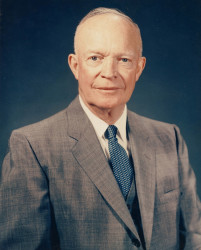(This video was made in 2010 but I re-post it for Banned Books Week)
To close out the 2013 edition of Banned Books Week, I offer the words of President Dwight D. Eisenhower in a commencement address delivered at Dartmouth in 1953:
Don’t join the book burners. Don’t think you are going to conceal faults by concealing evidence that they ever existed. Don’t be afraid to go in your library and read every book, as long as that document does not offend our own ideas of decency. That should be the only censorship.
–President Dwight D. Eisenhower, “Remarks at Dartmouth College Commencement (June 14, 1953)

President Eisenhower (Courtesy: Eisenhower Presidential Library and Museum)
(Source: Dwight D. Eisenhower: “Remarks at the Dartmouth College Commencement Exercises, Hanover, New Hampshire.,” June 14, 1953. Online by Gerhard Peters and John T. Woolley, The American Presidency Project. http://www.presidency.ucsb.edu/ws/?pid=9606.)
While books are rarely actually “banned” in America, the concept of restricting access to some books is much more commonplace, usually in classrooms and school libraries. Typically , books are pulled from shelves and reading lists after the objection of a an individual or group. The American Library Association, which sponsors “Banned Books Week,” explains the difference between “banned” and “challenged.”
A challenge is an attempt to remove or restrict materials, based upon the objections of a person or group. A banning is the removal of those materials. Challenges do not simply involve a person expressing a point of view; rather, they are an attempt to remove material from the curriculum or library, thereby restricting the access of others. Due to the commitment of librarians, teachers, parents, students and other concerned citizens, most challenges are unsuccessful and most materials are retained in the school curriculum or library collection.
As the nation debates “Common Core,” an educational approach that demands reading and responding to ideas, the importance of this reminder of the right to free expression and the value of THINKING in a free society is more urgent than ever.
You can find many more resources on the issue of “banned” and “challenged” books at the American Library Association.
The New York Times Learning Network also offers some good teaching resources on classroom discussion of “controversial” books.